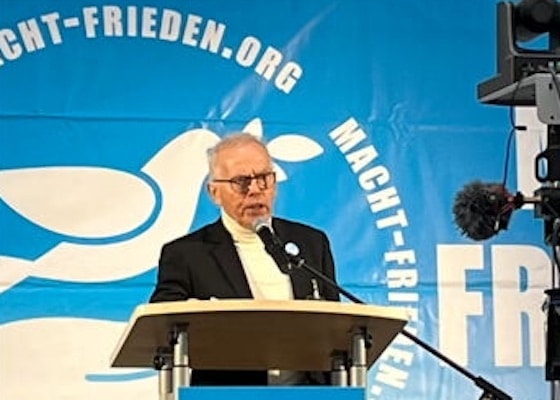For once, it wasn’t the well-known groups of the classic German peace movement that hosted a congress for peace. This time the initiative came from the heart of society, from craftsmen and entrepreneurs from small and medium-sized businesses. On Sunday, 2 April 2023, the “Craftsmen’s Peace Congress” took place in Dessau-Rosslau in Saxony-Anhalt, organised by Karl Krökel, head of the Dessau Metal Guild. About 250 people, twice as many as expected, came to the “Hugo Junkers” Museum of Technology. The star guest of the event was Gabriele Krone-Schmalz, long-time Russia correspondent for the German public TV channel ARD.
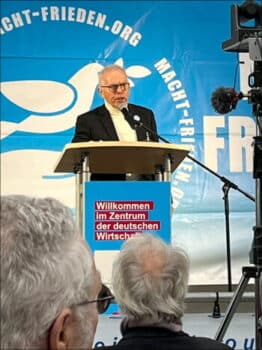
Karl Krökel, master craftsman of the district and initiator of “Craftsmen for Peace”. (Pictures gk)
In his opening speech, Karl Krökel addressed the dictatorship of opinion in times of war. For some months now, he has been committed as a master craftsman and entrepreneur to peace and to preserving the German economy. For his commitment, he was attacked and slandered in a way that is, unfortunately, common today, like so many who effectively oppose the prevailing “narrative” in public. He has stood firm and continues to keep the course. Organising this congress proves his resilience and courage.
Never apologise for having your own opinion
Karl Krökel spoke of the war against plurality of opinions and called for people not to bow to the dictate. “Never apologise for having your own opinion”, he encouraged the participants. The reason behind the failure of the 2022 peace negotiations, he said, was the failure of politics. “When people speak in a unilateral way, unilateral decisions also come about”—and thus the danger of nuclear war increases. It is the task of politics to avoid such a worst case. “If it does not, it is the duty of the citizens to stand up.”
Imposed “democratic” consensus is the precursor to fascism
Professor Krone-Schmalz, Russia expert and long-time ARD correspondent, began her presentation1 by addressing the diktat of opinion and one-sided propaganda in media, politics and published opinion. Among other things, she cited the term “war fatigue” as an example. This is a perverse term for the will for peace.
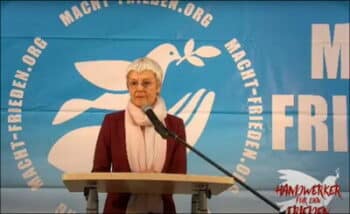
Prof. Gabriele Krone-Schmalz: “Democracy does not work
when citizens duck away.” (Screenshot of a recording)
Terms like “democracy” and “value-based politics”, which are constantly invoked today, lose credibility, she said, because in reality many people who do not go along with the prevailing opinion are excluded and do not find themselves to be part of the public debate. As a consequence many people no longer want to express themselves publicly. This is a danger for democracy, because “democracy does not work when citizens duck away”.In the previous century, we painfully learned that silent majorities end in a catastrophe. People who lived through the National Socialist era would perceive the atmosphere today very similar to that time. Gabriele Krone-Schmalz quoted the comment of a citizen: “democratic consensus is the precursor to fascism, no matter what kind”, and urged to “nip it in the bud”. If we fail to stop the development, she agreed with Karl Krökel, the nuclear super-disaster is imminent.
“Mature citizens are system-relevant to democracy”, emphasised Ms Krone-Schmalz. The prerequisite is to be informed as well and as comprehensively as possible.
“Understanding” is not the same as “supporting”
Ms Krone-Schmalz also referred to the absurd term “of Russland-Versteher”, in the sense of being a supporter of Russia which is misused as defamation. This term is also invoked to exclude her from the present media debate. She pointed out that “understanding” is not the same as “supporting”, but a change of perspective is necessary. Understanding is the self-evident prerequisite for judging things. Journalists who are not committed to the pursuit of understanding and truth, but represent a position and look at everything only through this lens, persue a wrong type of journalism; journalists shouldn’t take sides in the controversy of opinions, but should strive for objectivity.
With the term “narrative”, on the other hand, you are already distancing yourself from truth. It is only a kind of “storytelling”. When a narrative is enforced,
anyone dissenting is under suspicion.
She also spoke about the problem of dividing the world into good and evil: Condemning evil is a “declaration of political bankruptcy”. Replacing political analysis by morality is misleading. Politics should think things through to the end and have people in mind, rather than pursuing abstract principles.
An avoidable conflict
She commented in detail on the genesis of the Ukraine/Russia conflict. Former Soviet republics still had unfinished business with Moscow. This was understandable, however, these old grudges are transferred into today’s conflict. It is tragic that the EU is letting these states and their resentments against Russia take the lead in opinion and directives for action—with serious consequences.
After the dissolution of the Soviet Union, Yeltsin followed the recommendations of economic liberalism. The well-known results were a Wild West capitalism, rampant corruption, impoverishment of the population. The winners were the Oligarchs. Without scruples, they appropriated the property of the people. Anarchy ruled, there were no state or legal structures. The reputation of democracy and liberalism was permanently damaged by these conditions. Yet, in the West, Russians who questioned Yeltsin for his policies were criticised as backward-looking communist glorifiers.
Putin was the antithesis of Yeltsin. He gave back the self-confidence to the people. Putin spoke of the “dictatorship of the law”. “The West heard ‘dictatorship’, the Russians heard ‘law’». The Russians wanted stability and a livelihood which was more important to them than democracy. That was why they went along with Putin.
Putin does not want to go back to the days of the Soviet Union. Ms Krone-Schmalz quoted him: “whoever does not miss the Soviet Union has no heart, whoever wishes it back has no mind.” He had sought connection and cooperation with the West. If he had been accepted by the West during his first and second terms, Russian society would have developed completely differently, much more freely. Now, because of the risk of being attacked by the West, a hedgehog mentality has emerged.
EU: no independent policy
Unfortunately, voices in Europe who wanted to establish military strength independently from NATO were not able to prevail. Otherwise, an independent policy towards Russia would have been possible. The current conflict need not have arisen. There was also no official voice in the EU against Selenski’s war rhetoric. Nevertheless, the majority of Germans are in favour of negotiations. However, former British Prime Minister Boris Johnson had prevented peace negotiations.
Ms Krone-Schmalz quoted the expert of international law and former UN official Alfred de Zayas: both, the Americans and the EU had no right to jeopardise the survival of the planet for the sake of intra-European squabbling.
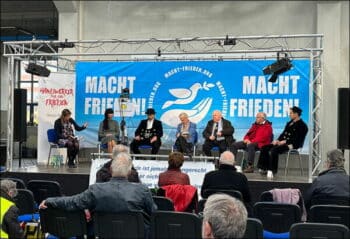
Craftsmen and peace activists on the podium.
Finally, she turned to the accusation of being dependent on Russia’s energy supplies and says economic dependence was part of globalisation. Everyone who is trading and is economically active is “dependent” on his business partners. What is the alternative to that? Or is dependence from Saudi Arabia any better?Finally, she invokes the recently deceased theologian and first-generation Green politician Antje Vollmer, who said: “we must unlearn hate and war.” And she added: well-understood democracy means interfering with fact-based opinions. The participants of the congress thanked Gabriele Krone-Schmalz with a standing ovation.
Wars are the greatest environmental destruction
In his presentation on “Environment and War”, the physicist and conflict researcher Professor Dr Jürgen Scheffran pointed out that wars have always been the greatest environmental destruction, and the current Ukraine conflict is no exception. The “climate chancellor” has now become a “war chancellor”. The military releases more emissions than entire countries. One of the greatest dangers is the legacy of nuclear bombs. In the Ukraine war, the Ukrainians destroyed dams to make the terrain impassable for Russians. The contamination of air and soil as well as the destruction of infrastructure, which would cost a lot of energy to rebuild, were also extremely harmful to the climate. It was remarkable that Professor Scheffran did not refer to the use of depleted uranium (DU) weapons, which London has been threatening to use. This ammunition contaminated air and soil during the war against Serbia and caused terrible impairments not only to participants in the war but also to those born afterwards.
“We craftsmen need peace. No craft can thrive in a state of war.”
Lively discussions took place in three forums, and the results were presented in the plenary session at the end. The final panel was largely made up of representatives of the guilds and other craftsmen. They reported about their commitment with statements, incendiary letters and the organisation of rallies but also on the counter reactions they face from the chambers.2 However, as a roofmaker in traditional roofer garb remarked, the craftsmen have the advantage that they cannot easily be pushed into a political corner. They are neither left nor right and are not part of the cross-thinkers scene.
Disbanding an industry
Peggy Lindemann, chemical worker and member of the workers’ council at the Schwedt oil refinery, took part in the panel. The Schwedt plant has been refining Russian oil from the Druzhba pipeline for decades. Oil that is now missing because of the sanctions. Thousands of jobs and thus an entire region are at stake. Ms Lindemann fought against the sanctions and thus against deindustrialisation within the trade union, but she got no support there. Obviously, the trade unions support the official political course. Officially, Schwedt now receives oil from other sources as a substitute. However, Ms Lindemann told us that this oil was much lighter than the Russian oil, that it could not be used to produce bitumen, which was needed to make asphalt. Moreover, lighter oil is said to damage the refinery facilities. In the long run this means: Schwedt will be shut down, an industry and a whole region will be disbanded.
Various master craftsmen described how their peace activities have exposed them to fierce reactions and even slander from the media and, in some cases, from the national chambers. Klaus Lothar Bebber, head of the Dessau Motor Vehicle Guild, referred to a letter on the sanctions against Russia in which the German Chamber of Skilled Crafts assures Chancellor Scholz: “the skilled crafts stand united behind you.” And this even after the Chamber of Skilled Crafts had already received several harsh letters from craft guilds in eastern Germany, who clearly took a stand against a policy causing lasting damage to the German industry and foremost to small and medium-sized businesses. Mr Wollsiefer, the then chairman of the Chamber, did not respond to the protest of the craftsmen as a result of his statement.
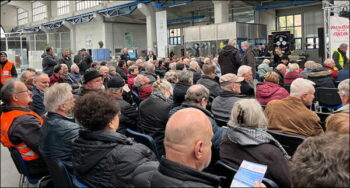
Crowded rows in the “Hugo Junkers” Museum of Technology.
A craftsman from Oranienburg summed up the concern of his colleagues:
We craftsmen need peace. No craft can thrive in a state of war.
Peace alliances with all who want peace
A main topic and question in the forums and on the podium was with whom people could and should join forces to oppose war and to revive a strong peace movement. Reiner Braun,3 a veteran of the German peace movement, took a very pointed stand on this. He stated that people in the East were more rebellious than those in the West. He considers the protest of the craftsmen to be very important.
He addressed the division of the German peace movement, which is more concerned with separating itself from right-wingers and conservatives and others than with striving for peace. Thus no strong movement can come about, said Rainer Braun and postulated:
If I am a leftist, I must be open to the right. With whom else should I make alliances?
The protest of the craftsmen was very important and encouraging. We are not alone, he explained, the majority of people in the world want peace. We have to talk to the people: at the workplace, in the church choir, in the sports club, in the trade union because people make history. Only they can bring about change in institutions. Change has to happen in people’s minds.
This was echoed by Christine Reymann, a journalist and peace activist. She said she was absolutely in favour of working with many in the peace movement.
We need to focus on the essentials. On ceasefire and negotiations. Then we can move on from there. We must not let ourselves be divided but should encourage each other. Plurality is needed in the peace movement.
The Congress of “Craftsmen for peace” ended with these encouraging and directional statements. Karl Krökel already announced further actions and networking. So we can look forward to it.
Notes:
- ↩Video recording of Ms Krone-Schmalz’s presentation at handwerker-fuer-den-frieden.de
- ↩The chambers are organised nationwide. They are superior to the regional and industry-associated guilds. It is compulsory for crafts people to be member of the guild. The president of the chamber is not elected. So it can happen that a chamber speaks on behalf of “the craftsmen” without them having been consulted, even if they have explicitly stated that they do not agree with a position.
- ↩Reiner Braun was, among other things, Executive Director and Co-President of the International Peace Bureau, IPB, in Geneva.

